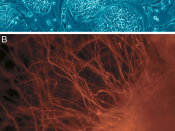In June 2004, USA Today reported that former President Ronald Reagan died from a long battle of Alzheimer Disease. (Stone and Vergano, 2004). Like many, I was saddened by this devastating news. In addition, actor Michael J Fox is currently fighting his battle with Parkinson?s. Both Alzheimer?s and Parkinson?s are diseases that have treatments but there are no cures. These diseases do not only transpire in celebrities, they also occur to individuals like us and people we know. According to National Institute of Health 4.5 million Americans suffer from Alzheimer?s and many Americans live with many other incurable diseases (National Institute of Mental Health, NIH, 2005).
According to James D. Watson (2003) ?genetic disorders such as Alzheimer?s and Parkinson?s often result in cell- by cell decimation of particular tissues such as nerve cells in these diseases. This results in serious and permanent damage in which there is no quick fix to this kind of insidious decay and there are no cures? (347).
Presently researchers are trying to find cures for these diseases which also include cancer and diabetes.
Researching stem cells is one of the areas scientists are investigating for the possibility of cell based therapies that can treat these incurable diseases. Scientist are beginning to learn how to induce stem cells to produce particular cell types that will hopefully in the future be able to replace damage cells into new healthy cells.
Due to the stem cell research advancing in the medical field, researchers have discovered there is a realistic chance embryonic stem cells contain the cure to treat diseases like Alzheimer?s and Parkinson?s in the future (Watson, 2003). However, there are reasons why so many disagree with the current research on using these embryonic stem cells to conduct this research. One of the reasons is the fact...


